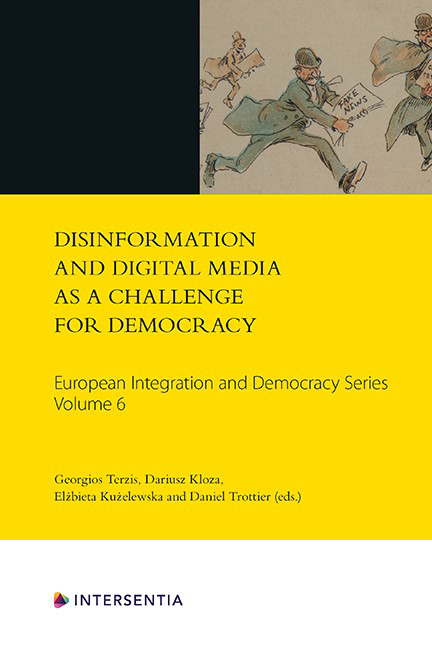Book contents
- Frontmatter
- Foreword: Fooling All of the People All of the Time: Democracy in the Age of Fake News
- Introduction: ‘They All Hear “Ping” at the Same Time’
- Contents
- List of Abbreviations
- List of Contributors
- PART I THEORETICAL APPROACHES TO AND THE CONCEPTUALISATION OF DISINFORMATION
- PART II EXPERIENCE OF DEALING WITH DISINFORMATION
- PART III SOLUTIONS TO DEAL WITH DISINFORMATION AND THEIR CRITIQUE
10 - Digital Disinformation in a Deeply Divided Society: Reflections from Northern Ireland
Published online by Cambridge University Press: 26 May 2021
- Frontmatter
- Foreword: Fooling All of the People All of the Time: Democracy in the Age of Fake News
- Introduction: ‘They All Hear “Ping” at the Same Time’
- Contents
- List of Abbreviations
- List of Contributors
- PART I THEORETICAL APPROACHES TO AND THE CONCEPTUALISATION OF DISINFORMATION
- PART II EXPERIENCE OF DEALING WITH DISINFORMATION
- PART III SOLUTIONS TO DEAL WITH DISINFORMATION AND THEIR CRITIQUE
Summary
INTRODUCTION
Despite its supposed central role in electoral'shocks'such as Donald Trump's election as US President in November 2016, ‘fake news’ remains one of the most popular misnomers of the 21st century. Members of the public broadly agree that it refers to ‘news articles that are intentionally and verifiably false’. Yet, it is also a pejorative term used by politicians to discredit media outlets that are critical of their conduct in office. By way of response, scholars characterise the current ‘post-truth’ era as a crisis born of the entire information ecosystem, not just the mainstream media. They argue that information disorders, such as the intentional sharing of false information to cause harm to others (disinformation) and the inadvertent sharing of such information (misinformation), are more appropriate conceptual frameworks for analysing the threat of information pollution to liberal democracies. Nevertheless, much of the empirical research in this field has concentrated on the supposed effects of digital disinformation, manufactured in ‘fake news factories’ for the financial gain of their ‘workers’ and amplified on social media by bots, on voting behaviour during national elections and referenda between 2015 and 2017. This is despite the fact that these ‘pure’ forms of ‘fake news’ have been virtually non-existent in most countries during this period.
There have been few studies exploring the impact of digital disinformation within deeply divided societies. Anti-Muslim riots in Myanmar in July 2014 were blamed on an unsubstantiated rumour spread on Facebook claiming that the proprietor of a Muslim tea shop had raped a Buddhist employee. The circulation of false stories on the same platform suggesting that Muslims were planning to violently overthrow the Buddhist majority were linked to sectarian violence in Sri Lanka in March 2018. Although there have been no such incidents in Northern Ireland to date, the limited empirical data available thus far suggests that false or fabricated content about contentious parades and related protests have a very short lifespan on social media and thus have limited influence on ‘real-world’ events.
- Type
- Chapter
- Information
- Disinformation and Digital Media as a Challenge for Democracy , pp. 179 - 200Publisher: IntersentiaPrint publication year: 2020
- 1
- Cited by



